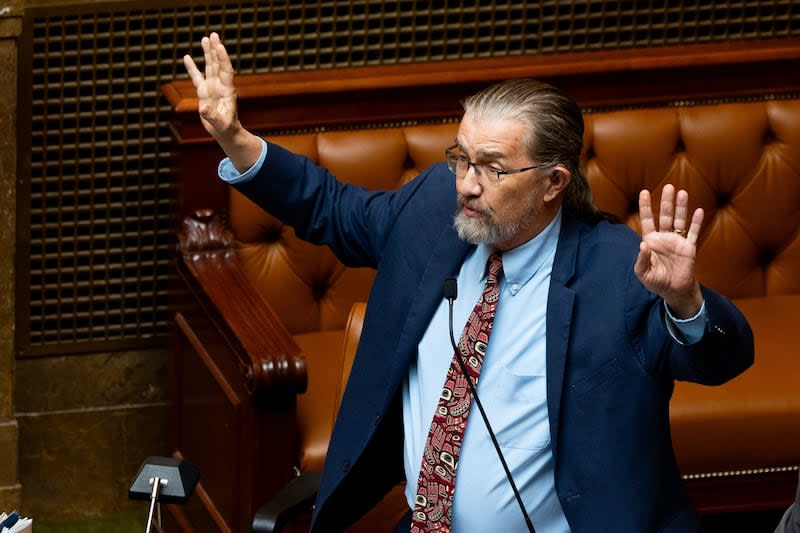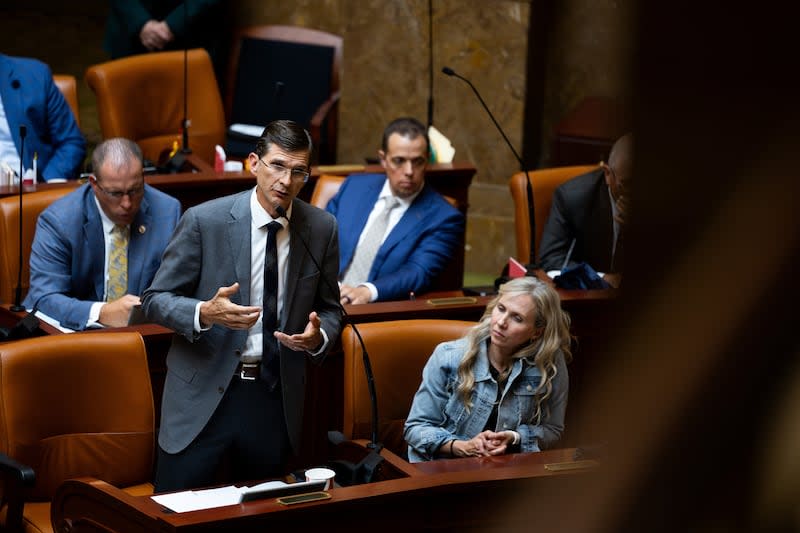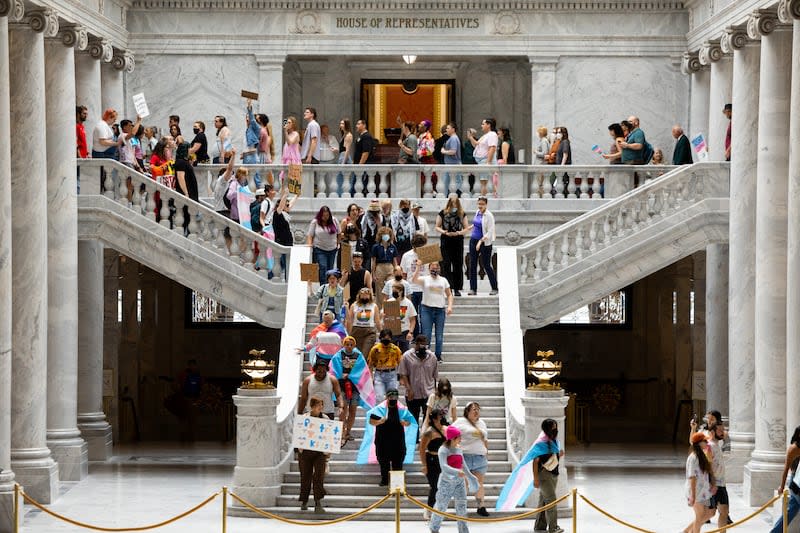The state House of Representatives debated then voted overwhelmingly in favor of two resolutions that authorize educators to enforce state law over new Title IX regulations, as more than 100 protesters chanted in favor of transgender rights in the rotunda of the Utah State Capitol on Wednesday.
The bills were also overwhelmingly approved by the Utah Senate. Votes were cast largely along partisan lines.
Convening in a special session, Utah lawmakers passed HCR301, sponsored by Rep. Kera Birkeland, R-Morgan, which will “prohibit a government officer from enforcing or assisting in the enforcement of the new regulations promulgated under Title IX.”
Earlier this year, Birkeland sponsored HB257 during the Legislature’s General Session. It requires K-12 students to use public school restrooms that match their sex designated at birth, restricting transgender access to “privacy spaces” in public schools and other publicly-owned buildings.
They also passed companion legislation, HJR301, sponsored by Rep. Neil Walter, R-St. George, which declares “Utah has the sovereign authority with rights and responsibilities to safeguard Utah’s men, women and children.”
The resolution states that the new Title IX regulations constitute “an overreach of federal administrative authority that violates Utah’s rights and interests to provide for the health, safety, welfare of, and to promote the prosperity of, Utah residents.”
The federal Department of Education’s new Title IX rules, set to take effect on Aug. 1, change the definition of sex discrimination to include gender identity and sexual orientation.
The new rules also broaden the definition of sexual harassment and stipulate that colleges and universities are no longer required to hold live hearings to allow students to cross-examine each other. Universities can still hold live hearings if they choose to but students will have the option to participate remotely and stop questions they find “unclear or harassing.”
According to leaders of the Utah State Board of Education, K-12 Utah educators have been asking for guidance on how to comply with the federal guidelines given conflicts between the regulations and state law. The board urged lawmakers to invoke the Utah Constitutional Sovereignty Act, which prohibits enforcement of a federal directive by “government officers” if the Legislature determines it “violates the principles of state sovereignty.”
Declining to enforce the federal rule could put federal education funding in jeopardy. In a gathering with reporters prior to the start of the special session, House Speaker Mike Schultz, R-Hooper, said the federal government provides about 10% of what Utah spends annually on education.
Much of that funding supports programs that serve some of the state’s most disadvantaged children, including Title I programs, school nutrition programs and special education.
Schultz said the state has sufficient funding in reserves to make up the difference if the federal government pulled Utah’s funding.
Utah is willing to sacrifice the funding to stand by its principles, he said.
“We’re on pretty solid legal ground,” Schultz said, noting recent federal district court rulings in Kentucky and Louisiana that have temporarily blocked the new Title IX rule from taking effect, with one judge describing the rule as an “abuse of power” by the Biden administration.
Utah has joined three other Republican-led states and four private entities in a lawsuit that challenges the U.S. Department of Education’s new Title IX rule as well.
“State’s rights means something and the overreach from the Biden administration and the federal government has gotten out of control. Federalism is the way forward,” Schultz said.
University of Utah law professor Cliff Rosky, however, said he believes the underpinning of the resolutions passed by lawmakers, the Utah Constitutional Sovereignty Act, “is unconstitutional. He said it violates the Supremacy Clause of the United States Constitution, which declares federal law, the “supreme law of the land.”
Senate President J. Stuart Adams, R-Layton, said Utah had dealt with the issue of transgender rights “better than any other state. You’ve seen states actually ban transgender sports. We put together a commission. There’s not another state in the nation that’s put together the commission to deal with transgender sports. We’ve led the nation. People shouldn’t be protesting. They should be celebrating what we’ve done,” he said.
The votes on the resolutions were split between Republicans and Democrats, with supporters applauding the move to back states rights and opponents expressing concern about the impact of the votes on transgender youth.
“We don’t need to pit one vulnerable population against another. Transgender kids are not an enemy. They’re not a threat to women. They are kids” struggling to live their lives “and the odds are against them. We should not be the ones making it harder for them,” said Rep. Sahara Hayes, D-Millcreek.
In Senate debate, Sen. Curt Bramble, R-Provo, said by passing the resolutions and previous legislation, “we’ve pounded a stake in the ground and said on these issues, Utah will stand firm and protect women. We’ve passed several bills to that regard and to the extent that the federal government is trying through inappropriate overreach to subvert those laws, we rely on SB57 that we passed. We rely on these resolutions. We say, ‘Not on our watch.’”
Sen. Jen Plumb, D-Salt Lake City, said she has been “unable to figure out if there is a right way to implement (previously passed) policy that is wrong. To me this feels wrong. It doesn’t feel right. It just feels like targeting. This feels politicized and truly it feels like we are really doubling down on hate for an already very marginalized, sometimes unloved-feeling section of our population.”
Sen. Dan Thatcher, R-West Valley City, said the Legislature’s action “very seriously places in jeopardy the $696 million that the federal government provides for nutrition programs, for Title I, for career and technical education, and especially for special ed. So while I do believe we have the authority to do this, and while I do believe that they do not have constitutional leverage … I do believe that that the lack of constitutional leverage will compel them to threaten funding. That’s the biggest thing that I’m worried about. I think this has huge risk.”
HJR301 states that the Education Department “has corrupted the mission of Title IX,” which is to promote women’s and girls sports and protect women and girls from discrimination in education and sports.
Moreover, the new regulations “harm students on college and university campuses by dictating the manner in which a student speaks and expresses opinions or thoughts, altering college and university anti-harassment processes and procedures, and interfering with a student’s due process rights.”
The resolution also states that the rule requires government support of abortion services “in direct conflict with the abortion ‘neutrality’ provisions adopted by Congress” and usurping Utah’s state laws on abortion.
According to the Education Department’s Office of Civil Rights, schools must not discriminate against any student, or exclude any student from their education program or activity, including any class or extracurricular activity, “based on a student’s pregnancy, childbirth, false pregnancy, termination of pregnancy, or recovery therefrom.” Discrimination against a school employee based on these conditions is likewise prohibited.
According to the Education Department’s Office of Civil Rights, schools must not discriminate against any student, or exclude any student from their education program or activity, including any class or extracurricular activity, “based on a student’s pregnancy, childbirth, false pregnancy, termination of pregnancy, or recovery therefrom.” Discrimination against a school employee based on these conditions is likewise prohibited.
HJR301 also states that the Utah Legislature “finds that the new regulations disadvantage women and girls who participate in women’s and girl’s sports by requiring that they compete against biological males.”
The Education Department has stated the final regulations do not include new rules governing eligibility criteria for athletic teams.
A statement by Equality Utah said the state would invariably “embark on costly and time-consuming litigation, all so that the state can continue to police bathroom usage by children. It is high time that Utah starts focusing its resources on helping our children achieve success rather than using them as pawns to score political points.”
Other education bills passed by lawmakers
Utah lawmakers also passed HB3001, which clarifies Utah law by allowing foreign exchange students to participate in the Statewide Online Education Program.
The bill’s sponsor, Rep. Candice Pierucci, R-Riverton, said without changes to the law some 200 students would be unable to complete their high school graduation requirements.
Under current law, the custodial parent of a student enrolled in a private or home school and taking an SOEP course must be a resident of Utah. HB3001 expands participation in the program by allowing foreign exchange students enrolled in a private school, whose custodial parent lives outside of Utah, to participate.
In other action, the Utah Legislature passed HB3003 to clarify the process for splitting a school district as communities in the Alpine School District, the largest district statewide with more than 87,000 students, contemplate a split.
Rep. Brady Brammer, R-Pleasant Grove, the bill’s sponsor, said the intent of the legislation was to avoid a “messy ballot” and a “messy outcome” if various options to split the district appear on ballots and more than one passes.
The bill eliminates the option for a local school board to initiate the process to create a new school district. It also creates a withdrawal process should voters approve a split and clarifies terms of school board members and other provisions.





Signup bonus from




